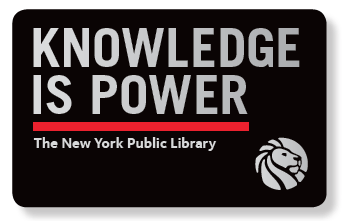Knowledge is Power: Educational Resources for Building Up
Last updated: June 24, 2019
New York Public Library card I got when I moved to New York
Knowledge is power. Knowledge is a privilege. If you think of people with privileges in life, the most significant thing they have is they know things that others don't. They know how to study. They know how to work. They know how to embrace and overcome failure. They know how to talk to people and present ideas.
I'm the same person right now that I was ten years ago: same aptitude, same willpower, and more or less the same character. The difference is that now I know things I did not know back then, and that's what makes my life different. It's the difference between a person earning 50k vs. 150k that I talked about in my first post. I also gathered experience in the last ten years, but I learned things the hard way. I learned a lot through trial and error and costly mistakes, and I believe I could have learned things easier and faster. It's usually smarter to learn from other people's experiences and mistakes. One of the reasons I started this blog was to help readers who are right now in the situation I was ten years ago to have an easier path to building up.
The good news is that nowadays, with some effort, you can also acquire this knowledge.
MOOC
MOOC (Massive Open Online Course) websites offer tons of useful information and knowledge. My first experience with a MOOC website was when my university didn't offer a cryptography class, and I found out that I can take a cryptography course on Coursera, and for free! Then I went on taking Engineering Long Lasting Software (ELLS Part 1, ELLS Part 2), and Artificial Intelligence. ELLS taught me Ruby on Rails and gave me a fresh motivation for writing software — because the tech was so cool compared to what I've experienced before. And all of this was completely free! What great times to live in!
Can this replace formal university education? I don't know. There's a value in being able to learn at your own pace, but I also think there's a value of being surrounded by other students. Also, I had a university education already, so for me, it was a great supplement. But it doesn't matter — the point is that any education and learning will put you a step ahead.
A good amount of MOOCs are free, but there are also paid ones. The costs were significant for me, so I mostly took free courses, and never paid for the certificates. That being said, now I try to pay for courses that I believe are worth it, also to support the cause.
University and Company Websites
Since MOOCs raise in popularity, many universities saw the value of open education and started putting free content online in the form of lecture videos and slides. The first such course I stumbled upon was the Justice by Harvard. Many universities have dedicated portals for open courses (MIT OpenCourseware, Berkeley Online Learning, Stanford Online, OpenHPI, Open Learn), but with some other universities, you need to do a little more digging to find topics that interest you. One trick I found was browsing professors' teaching websites to see the courses they teach — some of them have their slides and even videos available to the public.
Podcasts
I got into podcasts when I had an hour to an hour and a half commute when I lived in Bay Area. Listening to educational podcasts, I was fascinated by how much I learned in what I thought was supposed to be unproductive time. A valuable type of podcasts for me are lecture recordings — they're essentially MOOCs on your favorite podcasts app!
Some people listen to podcasts for entertainment. I don't do that. For me, podcasts are for learning, so I choose podcasts that can teach me something. Some podcasts I listened/listen to: Lifehacker Upgrade, HBR IdeaCast, Dear HBR, Jocko Podcast, How to Start a Startup (lecture recordings), Smart Passive Income, Freakonomics Radio, The Jordan B. Peterson Podcast, Recode Decode, How I Built This, Software Engineering Daily.
Your local public or university library
I didn't appreciate the value of this until later in life, but libraries have a lot to offer! Besides being to get a lot of books for free, you could also access a lot of online resources, and even get free internet. Some libraries even have free lynda.com membership — I found out that San Francisco library has one! It's also worth checking with local universities whether they have non-student memberships. Another great benefit of libraries is the environment. It's much easier to study when other hard-working people surround you.